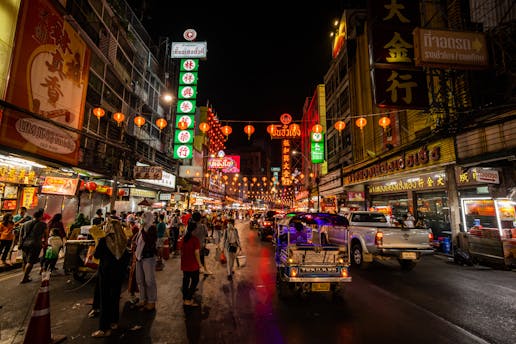Thailand, as a multicultural country, showcases a deep respect for Lunar New Year traditions among its Chinese community, despite the majority of the population practicing Buddhism. Through rituals such as ancestral worship, red envelope exchanges, and adherence to traditional taboos, the Chinese New Year is celebrated with unique Thai characteristics while preserving its cultural roots.
Ancestral Worship and Offerings: Blending Buddhist Elements with Traditional Practices
Among Thai-Chinese communities, Lunar New Year rituals are heavily influenced by traditional Chinese customs yet enriched with Buddhist elements. On New Year's Eve, families gather to prepare sumptuous offerings, including roasted pork, fish, chicken, and fruits, to honor ancestors and deities. Many also visit temples to participate in blessing ceremonies, praying for peace and prosperity in the coming year. The offerings often include uniquely Thai items such as coconuts and jasmine rice, reflecting a harmonious blend of local flavors and Chinese heritage.
The Red Envelope Tradition: Symbols of Blessings and Prosperity
Red envelopes (hongbao) are a cherished aspect of Lunar New Year celebrations within Thai-Chinese communities. Elders distribute red envelopes filled with Thai baht to younger family members, symbolizing blessings and good fortune. While the amount varies, the number "8" is particularly favored due to its phonetic similarity to "wealth" in Chinese. Additionally, red envelopes in Thailand often feature Buddhist motifs, adding a distinctive religious dimension to the tradition. Chinese elders in Thailand give red envelopes to the younger generation. (Photo: Pexels)
Chinese elders in Thailand give red envelopes to the younger generation. (Photo: Pexels)
New Year Taboos: Combining Chinese Traditions with Thai Values
In Thailand, Lunar New Year taboos largely follow Chinese traditions, such as avoiding sweeping the floor to prevent sweeping away wealth and refraining from speaking ill-fated words. However, Thai-Chinese communities place particular emphasis on avoiding arguments during the New Year, aligning with Thailand's "smile culture." Maintaining harmonious relationships is believed to bring good fortune for the year ahead.
The Lunar New Year in Thailand is a seamless fusion of local and Chinese cultures, where long-standing traditions and innovative adaptations highlight the Thai-Chinese community's dedication to preserving and evolving their heritage.







